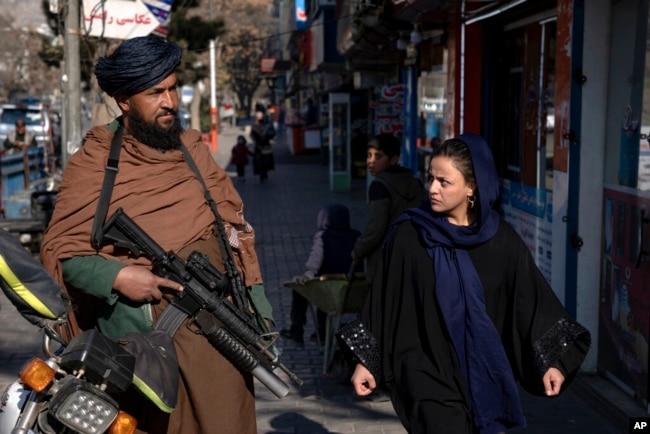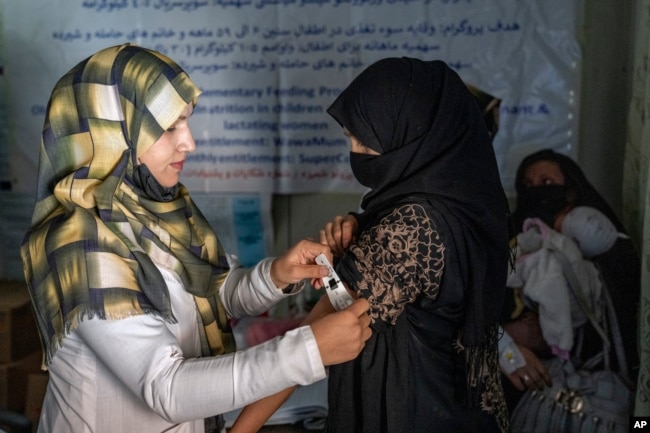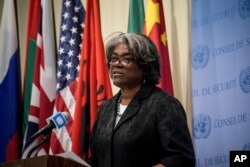The United Nations said Wednesday that it “condemns in the strongest terms” the Taliban’s decision to prohibit Afghan women from working for the world body in Afghanistan, calling the ban unlawful and unacceptable.
“It constitutes an unparalleled violation of women’s rights, a flagrant breach of humanitarian principles, and a breach of international rules on the privileges and immunities of the United Nations,” lamented the statement issued by the U.N. office in Kabul.
“The U.N. has therefore instructed all national staff — men and women — not to report to the office until further notice,” it said, adding that several U.N. national staff members had already experienced restrictions on their movements, including harassment, intimidation and detention.
The statement warned the Taliban order would further impact the international community’s engagement with Afghanistan and the U.N.’s ability, including that of its humanitarian partners, to reach the most vulnerable — especially women and girls — as they experience an unprecedented humanitarian crisis.

The Taliban have not publicly commented on the ban, but U.N. officials were notified Tuesday that previously existing restrictions on female relief workers were being extended.
The hard-line rulers have imposed sweeping restrictions on Afghan women since taking control of the impoverished South Asian nation in August 2021. Women have been banned from accessing higher education and many government jobs and public spaces. Girls are also not allowed to attend secondary schools beyond sixth grade.
In late December, the de facto fundamentalist leadership barred Afghan female staff members from working with domestic and international aid groups. It led to the suspension of some aid programs in Afghanistan, where the U.N. estimates more than 28 million people, or two-thirds of the population, are struggling to survive. Of those, 20 million people are food insecure, and 6 million are one step away from famine.
The U.N. has nearly 4,000 staff members in the country, of which about 3,300 are Afghan nationals. Among them are about 400 Afghan women and 200 international female staffers.
“In the history of the United Nations, no other regime has ever tried to ban women from working for the organization just because they are women. This decision represents an assault against women, the fundamental principles of the U.N., and on international law,” said Roza Otunbayeva, head of the U.N. mission in Afghanistan.

The statement noted that Otunbayeva was engaging with the de facto Afghan authorities to convey the U.N.’s protest and to seek an immediate reversal of the order.
The international community has not recognized the Taliban as legitimate rulers of Afghanistan, primarily over their treatment of women.

U.S. Ambassador to the United Nations Linda Thomas-Greenfield said Wednesday that the Taliban “cannot be allowed to continue to restrict women from providing support to women.”
“We are working very, very closely with our Afghan partners and fighting against what the Taliban are doing — their attempt to erase women. That is appalling. It’s unacceptable,” she said.
‘No compromise’
The de facto authorities have ignored calls to ease the curbs and dismissed criticism of their governance, saying it is in line with Afghan culture and Islamic law or Shariah.
In an apparent bid to reinforce their defiance, the Taliban last week reissued a recent audio speech of their reclusive radical chief, Hibatullah Akhundzada, with English subtitles.
“Today, the world does not want Afghanistan and its government to rule by its own will. Neither will I let them establish their law, nor will they allow me to apply my law,” Akhundzada told a gathering of Afghan religious scholars.
“Neither a compromise is possible, nor a compromise has been made. …Therefore, your responsibility is not just to successfully establish Shariah in Afghanistan; rather, it is incumbent upon the scholars of Afghanistan to lead the whole world on Shariah,” he said.




